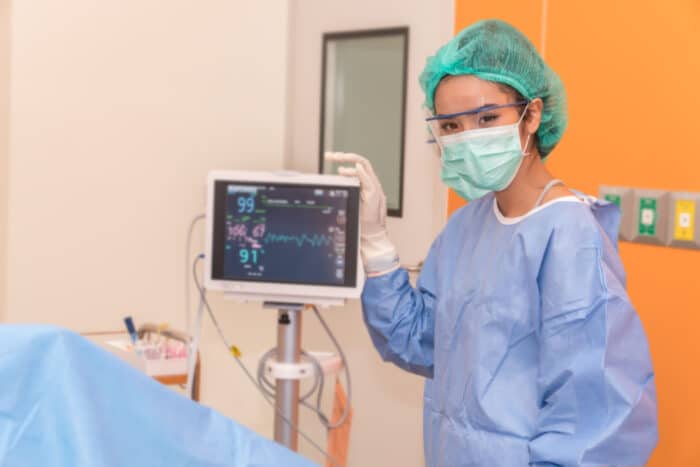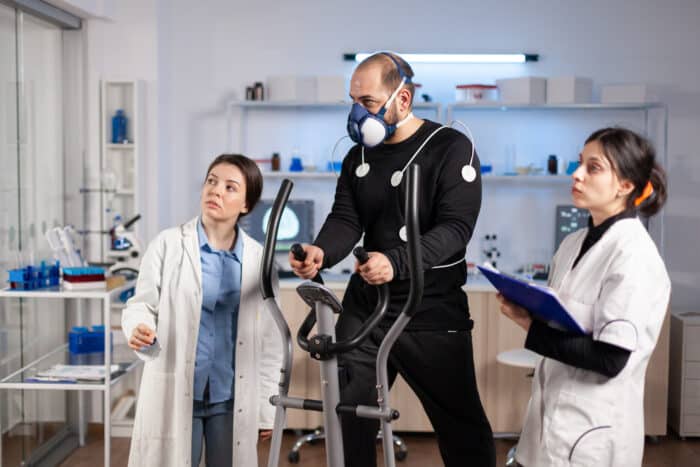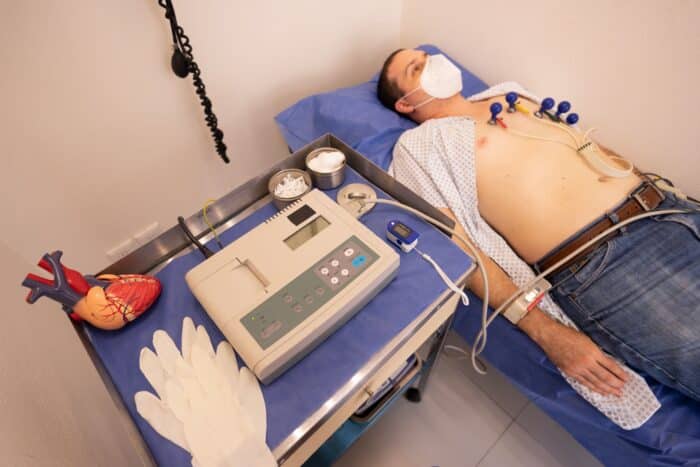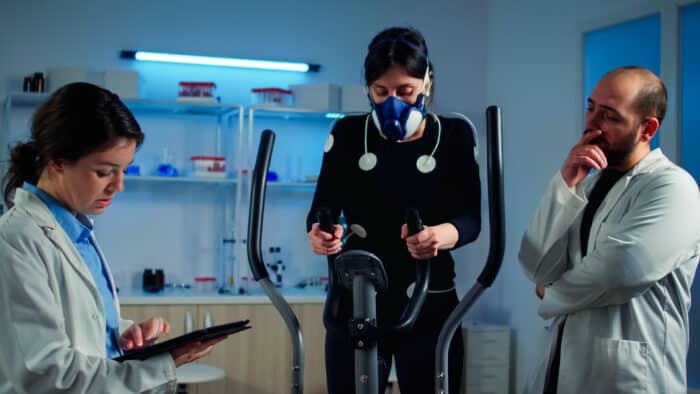Have you heard about EKG Techs and want to start your career as an EKG Technician?
You’re probably wondering what are the top job duties of an EKG Tech and what do EKG Technicians do on a day-to-day basis.
In this guide, we’re covering that, and you’ll learn about the top roles of an EKG Tech, plus essential skills that are required from an EKG Technician.
Defining an ‘EKG Technician’
Electrocardiograph (EKG) technicians are healthcare employees who help doctors perform diagnostic tests and identify cardiovascular problems in patients.
These tests, when performed, can easily help doctors to discover any type of irregularities in the heart that may lead to heart disease or a heart attack.
An EKG Technician mainly works in hospitals or long-term specialty care facilities, or private practices. An EKG Technician actively monitors the heart performance and patients’ blood pressure.
Read More: EKG Technician Job Description & EKG Technician Salary
EKG Technician Skills
There are some skills that you need to master as an EKG Technician; such skills are mentioned below:-
- Knowledge of Cardiac Anatomy and Physiology: As an EKG Technician, you need to have an understanding of the structure and function of a heart. You need to have a clear understanding of the heart’s anatomy and the functioning of the cardiovascular system.
- EKG Interpretation: As a Technician working in this role, you must be aware of EKG Interpretation. You should also be able to recognize normal heart rhythms, identify common abnormalities and arrhythmias, and understand their clinical implications. For this role, you need to stay updated with the latest findings and must be willing to learn consistently.
- Technical Proficiency: Familiarity with EKG equipment and the ability to operate it effectively is vital. This includes electrode placement, calibration, troubleshooting, and maintaining equipment to ensure accurate and reliable readings.
- Attention to Detail: As an EKG technician, you must have a detail-oriented mindset. Identifying subtle variations in waveforms, measuring intervals accurately, and detecting technical errors are essential to produce reliable results.
- Communication Skills: You will be dealing with a lot of people, including patients, doctors, and other staff. Strong communication skills are required to explain procedures to the patient and then report your findings to the doctor. You should be able to convey information clearly and compassionately.
- Patient Care and Empathy: Being able to provide excellent patient care is important in this role. Patients may be anxious or uncomfortable during the procedure, so your ability to reassure and empathize with them while maintaining their privacy and dignity is necessary.
- Time Management and Organization: EKG technicians often work in a fast-paced environment with multiple patients. Good time management skills, the ability to prioritize tasks, and staying organized are important to ensure smooth workflow and timely delivery of results.
- Professionalism and Ethics: As a healthcare professional, you must adhere to ethical guidelines and maintain patient confidentiality. For EKG Technicians, demonstrating professionalism, integrity, and respect for patients’ rights is essential.
- Teamwork and Collaboration: As EKG Technicians work as a part of a healthcare team with doctors and nurses, a strong sense of teamwork is always required. They must be able to coordinate with the other team members in a facility.
- Critical Thinking and Problem-Solving: EKG technicians must possess strong critical thinking skills to recognize and troubleshoot technical issues, identify irregular EKG patterns, and help in diagnosing cardiac conditions. For this role, you must be able to think analytically and make quick decisions.
Top 10 Duties of an EKG Technician
Here are the top 10 duties typically performed by an EKG technician:
- Prepare Patients: You will ensure patients are comfortable and prepared for the EKG procedure. This includes explaining the procedure, obtaining patient information, and addressing concerns or questions.
- Set Up Equipment: As an EKG technician, you will be responsible for setting up and calibrating the EKG machine and other necessary equipment, such as electrodes, leads, and recording devices.
- Perform EKG tests: You will conduct electrocardiogram tests on patients by attaching electrodes to specific locations on the patient’s chest, arms, and legs. You’ll ensure that the connections are secure and accurate.
- Monitor Patients: During the EKG test, you’ll carefully monitor the patient’s condition, ensuring that the equipment functions correctly and making necessary adjustments.
- Recognize Abnormalities: As an EKG technician, you’ll be trained to recognize abnormal EKG patterns or irregularities that may indicate potential cardiovascular problems. Promptly report any significant findings to the healthcare team.
- Maintain Records: Accurate documentation is crucial in healthcare settings. You’ll be responsible for maintaining patient records and ensuring the EKG readings are properly recorded, organized, and stored for future reference.
- Calibrate and Maintain Equipment: Regular calibration and maintenance of EKG equipment are essential to ensure accurate readings. You’ll be responsible for performing routine checks, troubleshooting issues, and reporting any equipment malfunctions.
- Assist During Stress Tests: In some healthcare settings, EKG technicians may assist in administering and monitoring patients during exercise stress tests. This involves attaching electrodes, monitoring vitals, and documenting changes throughout the procedure.
- Educate Patients: As an EKG technician, you may be required to provide basic information and instructions regarding their EKG test, including the purpose of the procedure and any necessary preparations or precautions. As a technician, you also have to explain the next steps, which means when they have to consult the doctor and when they are advised to conduct further tests.
- Practice Safety and Infection Control: In all aspects of your work, you’ll be expected to adhere to safety protocols and infection control measures. This includes proper hand hygiene, wearing personal protective equipment (PPE), and maintaining a clean, sterile work environment.
EKG Technician Requirements
To start your career as an EKG Tech, you need to meet certain requirements. Here are the top requirements of an EKG Tech –
- Get Your High School Diploma – This is a minimum requirement to work in the healthcare sector. You need to obtain your high school diploma or GED equivalent before you can start working.
- EKG Tech Training – You have to complete an EKG Tech training program. In your training, you’re mainly taught about the cardiovascular system, the EKG machine & its functioning, and the top duties you need to perform as a technician. If you want to start your career faster and without student loan debt, it’s recommended to enroll in an online EKG technician training program.
- Get Certified – After you’ve completed your training, you can sit for your CET Certification from the NHA. You have to sit for the CET examination, and once you clear that examination, you’re a Certified EKG Technician.
- Additional State Requirements – Apart from that, there can be certain licensing requirements that might vary from state to state. You can connect with local employers to know more about the local ekg technician requirements.
Related Resources:
Related Articles
-
How to Be Successful in College in 2022 – 7 Simple Tips to Succeed
-
How Do Scholarships Work? Read This First…Truth is Shocking
-
7 Best College Majors 2024: What Should I Major In?
-
How to Choose a College – 10 Things You Must Consider in 2024
-
Why Go to College? Top 13 Benefits for Adult Students in 2022
-
Top 5 Best Alternatives to Community College for 2024









